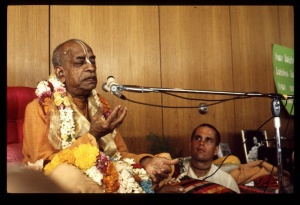SB 1.19.32: Difference between revisions
m (1 revision(s)) |
No edit summary |
||
| Line 1: | Line 1: | ||
{{info | {{info | ||
|speaker=King | |speaker=King Parīkṣit | ||
|listener= | |listener=Śukadeva Gosvāmī | ||
}} | }} | ||
[[Category:Srimad-Bhagavatam - Canto 01 Chapter 19]] | |||
[[Category:Bhagavatam Verses Spoken by Pariksit Maharaja - Vanisource|011932]] | |||
<div style="float:left">'''[[Srimad-Bhagavatam]] - [[SB 1|First Canto]] - [[SB 1.19: The Appearance of Sukadeva Gosvami|Chapter 19: The Appearance of Śukadeva Gosvāmī]]'''</div> | |||
<div style="float:right">[[File:Go-previous.png|link=SB 1.19.31]] '''[[SB 1.19.31]] - [[SB 1.19.33]]''' [[File:Go-next.png|link=SB 1.19.33]]</div> | |||
{{CompareVersions|SB|1.19.32|SB 1965|SB 1972-77}} | |||
{{RandomImage}} | |||
==== TEXT 32 ==== | ==== TEXT 32 ==== | ||
<div class="verse"> | |||
<div | :parīkṣid uvāca | ||
parīkṣid uvāca | :aho adya vayaṁ brahman | ||
aho adya vayaṁ brahman | :sat-sevyāḥ kṣatra-bandhavaḥ | ||
sat-sevyāḥ kṣatra-bandhavaḥ | :kṛpayātithi-rūpeṇa | ||
kṛpayātithi-rūpeṇa | :bhavadbhis tīrthakāḥ kṛtāḥ | ||
bhavadbhis tīrthakāḥ kṛtāḥ | |||
</div> | </div> | ||
| Line 19: | Line 24: | ||
==== SYNONYMS ==== | ==== SYNONYMS ==== | ||
<div class="synonyms"> | |||
<div | ''parīkṣit uvāca''—the fortunate Mahārāja Parīkṣit said; ''aho''—ah; ''adya''—today; ''vayam''—we; ''brahman''—O ''brāhmaṇa''; ''sat-sevyāḥ''—eligible to serve the devotee; ''kṣatra''—the ruling class; ''bandhavaḥ''—friends; ''kṛpayā''—by your mercy; ''atithi-rūpeṇa''—in the manner of a guest; ''bhavadbhiḥ''—by your good self; ''tīrthakāḥ''—qualified for being places of pilgrimage; ''kṛtāḥ''—done by you. | ||
parīkṣit | |||
</div> | </div> | ||
| Line 27: | Line 31: | ||
==== TRANSLATION ==== | ==== TRANSLATION ==== | ||
<div class="translation"> | |||
<div | |||
The fortunate King Parīkṣit said: O brāhmaṇa, by your mercy only, you have sanctified us, making us like unto places of pilgrimage, all by your presence here as my guest. By your mercy, we, who are but unworthy royalty, become eligible to serve the devotee. | The fortunate King Parīkṣit said: O brāhmaṇa, by your mercy only, you have sanctified us, making us like unto places of pilgrimage, all by your presence here as my guest. By your mercy, we, who are but unworthy royalty, become eligible to serve the devotee. | ||
</div> | </div> | ||
| Line 35: | Line 38: | ||
==== PURPORT ==== | ==== PURPORT ==== | ||
<div class="purport"> | |||
Saintly devotees like Śukadeva Gosvāmī generally do not approach worldly enjoyers, especially those in royal orders. Mahārāja Pratāparudra was a follower of Lord Caitanya, but when he wanted to see the Lord, the Lord refused to see him because he was a king. For a devotee who desires to go back to Godhead, two things are strictly prohibited: worldly enjoyers and women. Therefore, devotees of the standard of Śukadeva Gosvāmī are never interested in seeing kings. Mahārāja Parīkṣit was, of course, a different case. He was a great devotee, although a king, and therefore Śukadeva Gosvāmī came to see him in his last stage of life. Mahārāja Parīkṣit, out of his devotional humility, felt himself an unworthy descendant of his great ''kṣatriya'' forefathers, although he was as great as his predecessors. The unworthy sons of the royal orders are called ''kṣatra-bandhavas'', as the unworthy sons of the ''brāhmaṇas'' are called ''dvija-bandhus'' or ''brahma-bandhus''. Mahārāja Parīkṣit was greatly encouraged by the presence of Śukadeva Gosvāmī. He felt himself sanctified by the presence of the great saint whose presence turns any place into a place of pilgrimage. | |||
</div> | |||
<div | |||
<div style="float:right; clear:both;">[[File:Go-previous.png|link=SB 1.19.31]] '''[[SB 1.19.31]] - [[SB 1.19.33]]''' [[File:Go-next.png|link=SB 1.19.33]]</div> | |||
</div> | __NOTOC__ | ||
__NOTOC__ | __NOEDITSECTION__ | ||
Revision as of 05:00, 3 May 2021

A.C. Bhaktivedanta Swami Prabhupada
TEXT 32
- parīkṣid uvāca
- aho adya vayaṁ brahman
- sat-sevyāḥ kṣatra-bandhavaḥ
- kṛpayātithi-rūpeṇa
- bhavadbhis tīrthakāḥ kṛtāḥ
SYNONYMS
parīkṣit uvāca—the fortunate Mahārāja Parīkṣit said; aho—ah; adya—today; vayam—we; brahman—O brāhmaṇa; sat-sevyāḥ—eligible to serve the devotee; kṣatra—the ruling class; bandhavaḥ—friends; kṛpayā—by your mercy; atithi-rūpeṇa—in the manner of a guest; bhavadbhiḥ—by your good self; tīrthakāḥ—qualified for being places of pilgrimage; kṛtāḥ—done by you.
TRANSLATION
The fortunate King Parīkṣit said: O brāhmaṇa, by your mercy only, you have sanctified us, making us like unto places of pilgrimage, all by your presence here as my guest. By your mercy, we, who are but unworthy royalty, become eligible to serve the devotee.
PURPORT
Saintly devotees like Śukadeva Gosvāmī generally do not approach worldly enjoyers, especially those in royal orders. Mahārāja Pratāparudra was a follower of Lord Caitanya, but when he wanted to see the Lord, the Lord refused to see him because he was a king. For a devotee who desires to go back to Godhead, two things are strictly prohibited: worldly enjoyers and women. Therefore, devotees of the standard of Śukadeva Gosvāmī are never interested in seeing kings. Mahārāja Parīkṣit was, of course, a different case. He was a great devotee, although a king, and therefore Śukadeva Gosvāmī came to see him in his last stage of life. Mahārāja Parīkṣit, out of his devotional humility, felt himself an unworthy descendant of his great kṣatriya forefathers, although he was as great as his predecessors. The unworthy sons of the royal orders are called kṣatra-bandhavas, as the unworthy sons of the brāhmaṇas are called dvija-bandhus or brahma-bandhus. Mahārāja Parīkṣit was greatly encouraged by the presence of Śukadeva Gosvāmī. He felt himself sanctified by the presence of the great saint whose presence turns any place into a place of pilgrimage.